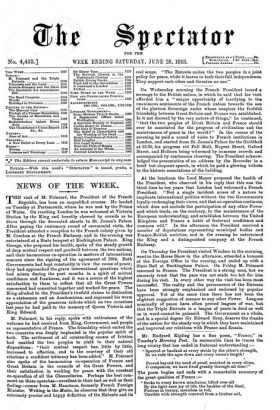M. Poincare, in his reply, spoke with enthusiasm of the
welcome he bad received from King, Government, and people as representative of France. The friendship which united the two countries was deeply implanted in the popular spirit of both. The settlement of all outstanding causes of friction had enabled the two peoples to yield to their natural dispositions : " their mutual respect has, little by little, increased to affection, and to the courtesy of their old relations a confident intimacy bas been added." M. Poincare also spoke of the harmonious co-operation of France and Great Britain in the councils of the Great Powers, and their satisfaction in working for peace with the constant co-operation of all the Chancelleries. Perhaps the best com- ment on these speeches—excellent in their tact as well as their feeling—comes from M. Hanotaux, formerly French Foreign Minister. Writing in the Matin, he observes that they give an extremely precise and happy definition of the Entente and its
real scope. "The Entente unites the two peoples in a joint policy for peace, while it leaves to both their full independence. They support each other and threaten no one."


























































 Previous page
Previous page